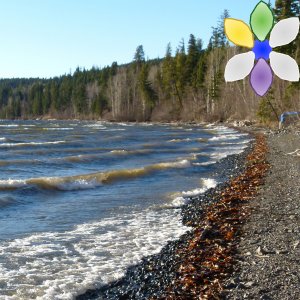Clam Gardens Restore Coastal Health and Indigenous Cultures
October 11, 2017 by Shanna Edberg
 Coast Salish tribes in British Columbia, together with The Clam Garden Network, are reviving ancient clam gardens using traditional First Nations methods. These coastal gardens, maintained without the use of plastics or pesticides, provide habitat for sea life and improve local biodiversity. They also provide a sustainable, local, and healthy food source to the coastal tribes. The rock walls used for the gardens provide a buffer against storms and sea level rise, and the intergenerational practice of maintaining the gardens provides an opportunity for tribal elders to pass on their language, knowledge, and culture to younger generations.
Coast Salish tribes in British Columbia, together with The Clam Garden Network, are reviving ancient clam gardens using traditional First Nations methods. These coastal gardens, maintained without the use of plastics or pesticides, provide habitat for sea life and improve local biodiversity. They also provide a sustainable, local, and healthy food source to the coastal tribes. The rock walls used for the gardens provide a buffer against storms and sea level rise, and the intergenerational practice of maintaining the gardens provides an opportunity for tribal elders to pass on their language, knowledge, and culture to younger generations.
Climate Protection: Reduces carbon emissions from food production and transport Resilience: Protects from storms and sea level rise Food & Water: Provides access to healthy food Connection: Encourages community engagement, education, and passing on indigenous cultures
This post is part of a series on examples of multisolving, or climate-smart policies that simultaneously work to mitigate climate change while providing co-benefits such as the ones described above. The multiple benefits analysis was done using the FLOWER framework.

 Coast Salish tribes in British Columbia, together with The Clam Garden Network, are
Coast Salish tribes in British Columbia, together with The Clam Garden Network, are